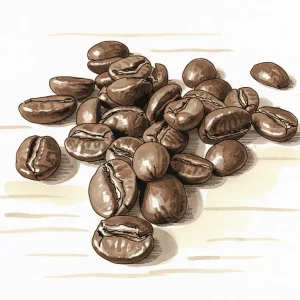Keen Coffee
Since 2016, Keen Coffee from Utrecht has grown into a frontrunner in Dutch specialty coffee, driven by barista champions, light roasting, single‑origin transparency, sustainable direct trade, innovative experiments, and a vibrant coffee bar that offers tastings and courses to the public.
Keen Coffee Beans
Showing 1–16 of 28 results
De goedkoopste prijzen per 1 kg worden weergegeven
-
Andrès Torres Geisha
€ 72,00 -
Buena Vista
€ 43,60 -
Buesaco Collective
-
Caimo Collective
€ 13,30 -
Chinchilla
-
Danche
-
El Diamante Geisha
-
Frinsa
-
Hambela
€ 43,60 -
Jaguara
€ 36,00 -
Jukia Park
€ 72,00 -
Kerugoya
More About Keen Coffee
Introduction
Since 2016, Keen Coffee from Utrecht has become a mainstay in the Dutch specialty scene. Two barista champions, Bonne Postma and Rob Kerkhoff, together with veterans Jan and Tosca Schuitemaker, started a roastery that puts curiosity at the centre. Their light roast profiles reveal the precise origin of the bean and inspire both professionals and home baristas. This approach already earned worldwide recognition in 2018, when a Costa Rican El Diamante Maria brought Keen to third place at the World Barista Championship.
Origins and Growth Path
The debut took place at the 2016 Amsterdam Coffee Festival, where the fresh branding and open sharing of knowledge immediately caught the eye. In the first years Keen mainly supplied cafés and restaurants, but the pandemic forced a rapid shift to direct online sales. The popular Tasting Box, containing several small bags of single origins, helped thousands of home tasters broaden their palate.
The move to its own physical meeting place followed in 2024 with the opening of the Keen Coffee Bar in Utrecht. There, fifteen or more coffees are on the grinder each day, and barista trainers share their expertise through tastings and SCA‑certified courses. In this way the brand brings knowledge, experience, and sales together under one roof.
Philosophy of Light Roasting
Keen uses an energy‑efficient Loring roaster that roasts almost smoke‑free and offers extreme precision. The team roasts as lightly as possible to preserve the bean’s natural sugars and acids, allowing aromas to emerge clearly and with layers. “Flavour can’t be added, but potential can be maximised,” Postma always emphasises. Thanks to meticulous data profiles and regular cuppings, every microlot remains under strict supervision.
Single Origins that Stand Out
Blend? Not at Keen. Every bag contains coffee from a single farm or cooperative, with the farmer, region and process clearly stated on the label. This transparency helps consumers link origin stories to flavor nuances and rewards farmers for their craftsmanship.
- Wolichu Wachu (Ethiopia): strawberry, bergamot, grapefruit, sparkling acidity
- El Diamante Maria (Costa Rica): geisha variety, honey process, floral sweetness
- Jaguara Estate (Brazil): creamy chocolate note and gentle nuttiness
- Mitad del Mundo (Ecuador): tropical fruit and jasmine, limited release 2023
- Mount Elgon (Uganda): blackcurrant and cacao, taster box favorite
- El Diamante Maria (Costa Rica): geisha variety, honey process, floral sweetness
- Jaguara Estate (Brazil): creamy chocolate note and gentle nuttiness
- Mitad del Mundo (Ecuador): tropical fruit and jasmine, limited release 2023
- Mount Elgon (Uganda): blackcurrant and cacao, taster box favorite
Experimentation and Innovation
Every roast is a small experiment. The team tests variables such as airflow and development time to fine‑tune micro‑adjustments. Seasonal lots with anaerobic fermentation or rare varieties regularly appear, after which customer feedback influences the final profile. That iterative R&D culture keeps the offering dynamic and sparks curiosity in the drinker.
Collaboration with Farmers
Direct trade forms the backbone of the quality guarantee. Keen pays farmers a premium above the market price and consistently buys back, allowing producers to invest in better drying beds or fermentation tanks. The first partnership, with the Brazilian farmer Natalia, became the model for later relationships in Ethiopia, Kenya and Colombia. Full traceability down to plot level is standard.
Design that Stands Out
A bright blue‑white color palette, minimalist geometry and a matte finish make the packaging instantly recognizable. Graphic designer Jorgen Koolwijk gained international attention with this concept, which looks both clear and playful. Striking detail, the definition of the word “keen” adorns every bag, inviting customers to join in the search for the perfect cup.
Outlook
The coming years will focus on new origins, further sustainability and possibly additional tasting locations. Electric or low‑emission roasting technology is high on the wish list, as are packages with a smaller ecological footprint. Further expansion of the direct network should yield exclusive microlots and create room for joint fermentation experiments on site.
Conclusion
Eight years after its founding, Keen Coffee stands as a symbol of curiosity, precision and fair trade. The brand proves that lightly roasted single origins and close ties with farmers are not only tasty but also scalable. Anyone wanting to follow the coffee world will find in Keen an inspiring example of how flavour, sustainability and design go hand in hand.



